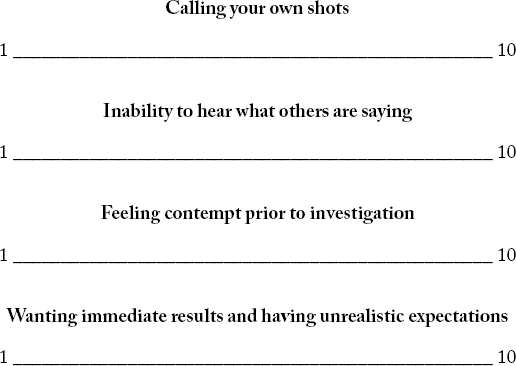
Overconfidence is a major threat to recovery. Addicts believe they can handle situations without respect for the dangers of active addiction. Signs of overconfidence include:
• Calling your own shots
• Inability to hear what others are saying
• Feeling contempt prior to investigation
• Wanting immediate results and having unrealistic expectations
Calling your own shots is a first sign of overconfidence. When you first enter into recovery, you may have attended numerous meetings, established a relationship with a sponsor, and started to build a support system.
As time in recovery progresses, people often begin to feel better about themselves and their life in recovery. Once you feel better, it becomes easy to reject what others are suggesting. You begin to replay those old internal tapes. I know what’s best for me or I can do it by myself, I have for all these years and I am still alive. In twelve-step meetings this is known as “yes, butting”—“Yes, but I am not like those people.” “Yes, but I am not dead.” “Yes, but I have not lost my wife.” “Yes, but I have not lost my job.”
In essence, you are ready to take back total control of your life. This demonstrates the power of the addictive process and the grandiose thinking that addicts regularly engage in. To paraphrase an Alcoholics Anonymous saying “my best thinking kept me drinking, drugging, gambling, etc.” Many people forget what they learned from the First Step of any twelve-step recovery program: they are powerless over their addiction and their lives have become unmanageable.
Inability to hear what others are saying is the second sign of overconfidence. Has this happened to you? You were in a self-help group meeting and discounted what others were saying because you figured it did not apply to you. Addicts are so well practiced at listening to their own voice of denial and justification that they have great difficulty absorbing input from outside sources. Again, they often think, My situation is different. “I was sober for about two years,” Francine shared. “Then, my old friends invited me to a birthday party. I called my sponsor who told me to avoid the party. I went anyway because I had confidence in myself. When I got there, everybody was using. Before long, I found myself thinking that maybe this time would be different. That was when I relapsed.”
Feeling contempt prior to investigation is the third sign of overconfidence. This is a way of discounting methods of recovery that have a long history of proving effective because you don’t like them or assume they cannot work for you. Has this happened to you? For example, it was suggested that you go to a Narcotics Anonymous, Alcoholics Anonymous, or another type of twelve-step meeting. After the first fifteen minutes of the meeting, you decide this meeting is not for you. No one there had anything to offer you. Or, perhaps you didn’t even bother to try the meeting out. You rejected the idea without any investigation. “I wasn’t like those people around me. I hadn’t lost everything to my addiction, ended up divorced, lost my house, or anything like that. I left twelve-step meetings because I couldn’t identify with how sick those people were.”
Wanting immediate results and having unrealistic expectations is the fourth sign of overconfidence. Addicts tend to want immediate results. This is especially true for the addict whose pattern has been one of instant gratification.
You may have said to yourself, “After all, I have been sober six months and my employer still hasn’t given me back all of the responsibility I once had.”
“My wife does not fully trust me around other women even though I was only unfaithful when I was using. I only used for the last fourteen years.”
“I haven’t been below my required calorie limit for three weeks now; the doctor isn’t being fair about saying it’s dangerous to participate in my sport.”
The thinking here is I expect that because I have been in recovery, the world should give me what I want and should give it to me right now. If it doesn’t, then why should I put all of this effort into my abstinence? There is an attitude that the rest of the world owes you. You may think I’ve got something coming. I should be rewarded because I have given up so much—my alcohol, drugs, sex, gambling, or other addiction.
This thinking is often referred to as “terminal uniqueness.” It is the belief that your situation is different from everyone else’s and that you deserve preferential treatment.
For most people, life in recovery does get better, but it takes time and it is not always in the time frame you prefer. Recovery is a process, not an event. Recovery includes the ability to recognize that others have something of value to offer, and that no one has all the answers.
Remember, it’s your best thinking that got you where you were—deep in active addiction.
Rating Signs of Overconfidence
On a scale from 1 to 10, rate how much you identify with each specific form of overconfidence by writing the number of your rating on the lines below. A rating of 1 means you identify with it very little, and a rating of 10 means that you identify with it completely.

What did you learn?

Are you talking about your overconfidence in your home group? With a sponsor? With a counselor? The first step is recognizing how signs of overconfidence are problematic; the next step is holding those signs up for the light to shine through by talking about it with others.
The following exercises will help you to explore signs of overconfidence more thoroughly.
Calling Your Own Shots
Examples
My wife suggests I not attend a bachelor party, but I went anyway. |
Everybody was using; I found myself craving the drug. |
I took on an unnecessary additional project at work when I was already stressed even though my sponsor had discouraged it. |
I found myself making excuses to not attend recovery meetings. |
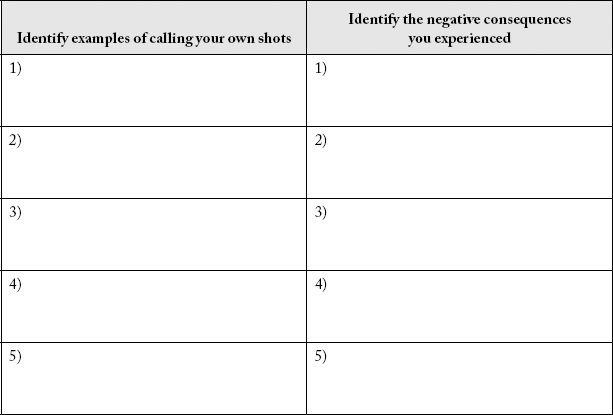
Inability to Hear What Others Are Saying
Examples
I was told not to drink alcohol, but because my problem was cocaine, I thought that was ridiculous. |
Started drinking beer nightly. Within two weeks I was using cocaine. |
It was suggested that I not go into convenience stores as they could trigger urges to smoke and gamble. |
Within four weeks I was rationalizing I could play the Lotto safely. Within eight weeks I was smoking again and my gambling was out of control. |
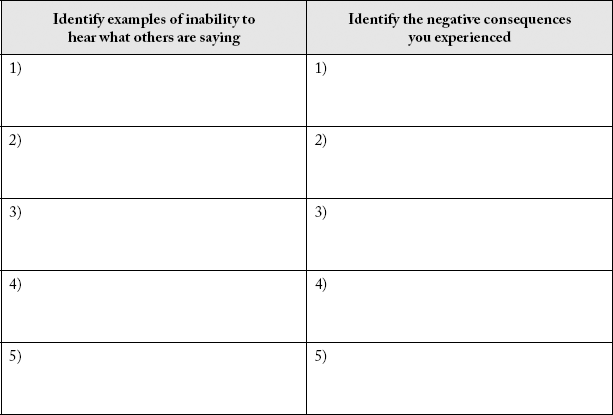
Feeling Contempt Prior to Investigation
Examples
I decided the female counselor I was supposed to see wouldn’t understand me, so I didn’t show up for the session. I don’t know if she would have helped me or not. |
Quickly returned to negative thinking and sought out previous friends to support it. |
I refuse to try meditation because it seems too weird. |
I can’t find the serenity others seem to find. I continue to feel anxious and stressed. |
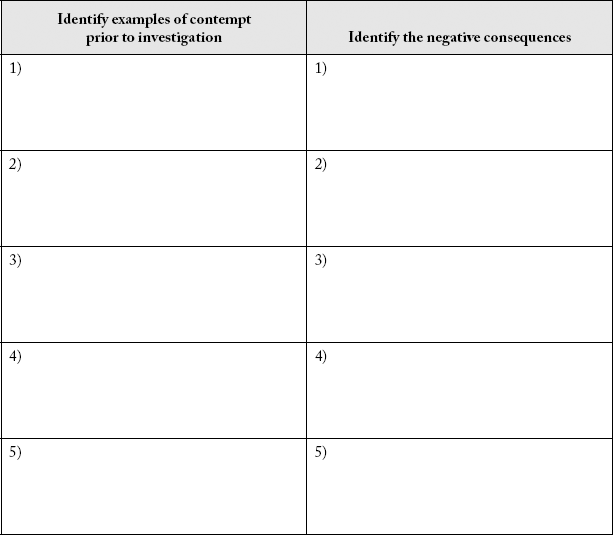
Wanting Immediate Results and Having Unrealistic Expectations
Examples
I expected my children to be loving and fully supportive because I went to treatment. |
Became angry with them when I didn’t get the loving attitude I expected, and that became a justification for my relapse. |
I wanted a job at the same salary level as others at my level of experience. |
I refused lower paying jobs, didn’t get work, couldn’t pay any bills, became resentful, and started acting out. |
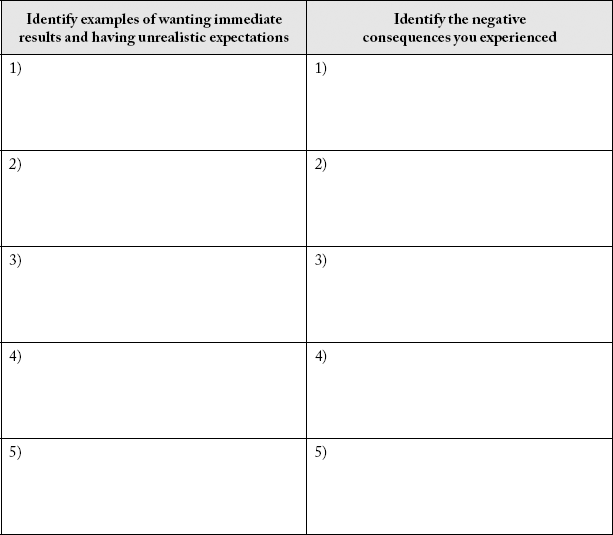
Are you willing to address these issues openly?
Yes  No
No 
If yes, with whom and when will you discuss this?

If no, what are your reasons and concerns?

Be patient
Have an open mind
Listen and hear Have
realistic expectations
Today, I am grateful for _________________________________________